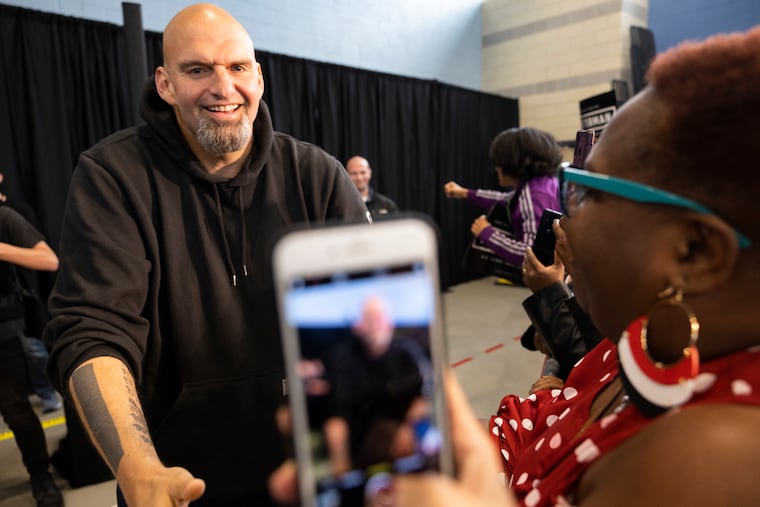Black Pennsylvanians showed up for John Fetterman. Now he needs to show up for them.
Black voters showed up for John Fetterman on Tuesday, even though he didn't fully show up for them during his campaign. Now it's his turn to give back.

Black people turned out for John Fetterman this year, big time. According to NBC exit polls, 91% of Black voters chose him over Mehmet Oz to represent Pennsylvania in the U.S. Senate. In contrast, only 68% of Latino voters and 45% of white voters did the same.
I wasn’t so sure this would happen.
Fetterman’s campaign got off to a rocky start in January with Black voters after he didn’t attend a forum for Senate candidates at the city’s large African American church Enon Tabernacle Baptist Church in Germantown.
Granted, Fetterman had a legitimate scheduling issue in Harrisburg, but the invitation had been extended two months prior, a church official told me on Wednesday. Fetterman’s team should have arranged for him to arrive to the event late. The Senate candidate’s absence didn’t sit well with a lot of folks — including me. I wasn’t at Enon Tabernacle, but I certainly heard about it. It felt like a snub.
“He’s the lieutenant governor. He could have gotten here. If he needed an escort or whatever, he could have gotten what he needed to be there on time,” Bishop Dwayne D. Royster, executive director of POWER, a Pennsylvania grassroots organization that represents more than 50 churches, told me this week.
Back then, a lot of folks didn’t know much about Fetterman, outside of his being Pennsylvania’s lieutenant governor and a former mayor of Braddock. Skipping the January event really was a missed opportunity. And many never forgot it.
Just as we haven’t forgotten the infamous 2013 incident in Braddock when then-Mayor Fetterman held an unarmed Black male jogger at gunpoint, wrongly believing the jogger had been involved in a shooting. Mistakes happen, but when they do, candidates for public office need to be prepared to talk about the lessons they learned. But Fetterman hasn’t really done that. When I asked him about the subject during a meeting with The Inquirer’s editorial board in October, I was taken aback by his apparent lack of introspection on the topic.
All that is behind us now. Fetterman will be Pennsylvania’s next U.S. senator. Despite the Republican rhetoric, the red tide never materialized in Pennsylvania. Fetterman, with his trademark hoodie and tattoos and working-class appeal, handily defeated Mehmet Oz, the slick, camera-ready, carpetbagging TV doctor from New Jersey.
But even though the overwhelming majority of Black voters in Pennsylvania came around to Fetterman, not all of them did.
Before the election, I spoke with Randy Robinson, a Republican political affairs strategist who voted for Oz — and even appeared alongside him in a much-aired campaign ad. Robinson told me why he wasn’t going to back Fetterman.
“He remained largely an unknown entity for far too long,” he said. What’s more, noted Robinson, Fetterman’s campaign message of “every county, every vote” meant he spent lots of time in red counties, which are predominantly white, instead of focusing on diverse districts such as Philadelphia. “That’s an omission that speaks to his campaign’s greater concern for extending themselves to white voters, [as] opposed to fortifying his Black base.”
But to some Black voters, Fetterman did just enough — eventually.
“Toward the end of the campaign, you almost thought John Fetterman lived in Philadelphia,” the Rev. Mark Tyler, senior pastor of the historic Mother Bethel A.M.E. Church, told me. “I was there at the first big rally that he held in Philadelphia. ... My sense walking away was that they were probably all saying as a campaign, ‘We should have been here before.’ Because Philadelphia had nothing but love for him and for his wife and for the campaign.”
In the end, “Black voters are very pragmatic,” Tyler continued. “We understand that we may have wanted someone else in the primary, but the primary is finished. We have already moved on because the issues that we face don’t have time for petty differences and hard feelings.”
It also probably didn’t hurt that Oprah Winfrey, who launched Oz’s TV career, endorsed Fetterman just days before the election.
Ray Block, an associate professor of political science and African American studies at Penn State, believes that endorsement made all the difference. “Oprah might have come through [for Fetterman] at a time when he needed it,” Block told me. Oprah’s late endorsement, in a way, helped to gloss over Fetterman’s missteps with the Black community.
Now that he’s a senator-elect, hopes are sky high for Fetterman. At 53, he is still a relatively young man. The lieutenant governor has plenty of good people around to guide him as he navigates his new political landscape. Fetterman ran on a great platform of protecting women’s reproductive freedom, increasing the minimum wage, and expanding Medicare, among other goals.
“I would have preferred somebody else other than [Fetterman] because he showed a little arrogance toward our community,” the Rev. Allyn Waller, Enon’s pastor, told me. Now, Waller wants Fetterman to take his mandate to heart, and also remember who got him where he is.
“I hope he remembers that [the Black community] worked very hard and that he’s in [the Senate] because we worked very hard. I think that’s one of the things that we have to remind the Democratic Party in general,” Waller added. “The Black community came through for [Democrats].”
We certainly came through for Fetterman. If he’s smart — which he certainly is — he should never forget it.